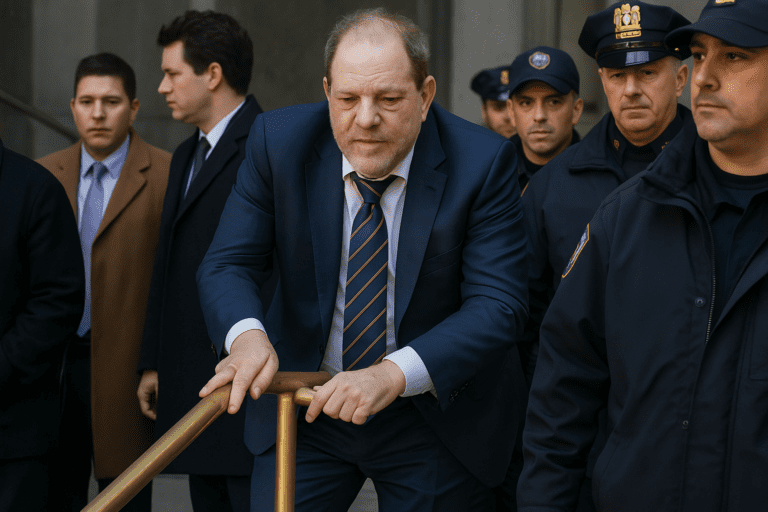In a surprising legal turn, the New York Court of Appeals has vacated Harvey Weinstein’s 2020 conviction for rape and sexual assault, citing significant procedural errors that compromised the fairness of the original trial. The decision has reignited public and legal debates over the intersection of media influence, public sentiment, and the integrity of the judicial process. Once a Hollywood titan, Weinstein now faces the prospect of a retrial, further complicating his already troubled legal journey and the broader conversation about justice for sexual assault survivors.
Grounds for the Overturn
The Court of Appeals identified several flaws in the original trial that rendered it unfair. Central to the court’s ruling was the inclusion of testimony from women whose allegations were not directly tied to the charges against Weinstein. The prosecution had argued that the testimonies were crucial in showing a pattern of behavior. However, the court ruled that introducing this evidence was prejudicial, as it could have caused the jury to focus on Weinstein’s character rather than the concrete facts of the case. This, the court argued, violated Weinstein’s right to a fair trial.
Additionally, the court raised concerns about the broader cultural atmosphere surrounding the trial, particularly the influence of the #MeToo movement, which had gained significant momentum in the years leading up to the conviction. Legal experts pointed out that while public sentiment and social movements are important, they must not cloud the judicial process. The court underscored the need to keep external pressures, including those generated by media coverage and public opinion, separate from the decision-making of a jury.
The Impact on Symbolism and Justice
Weinstein’s conviction was a landmark moment for the #MeToo movement and the fight against sexual misconduct, especially in industries with entrenched power dynamics like Hollywood. His fall from grace sparked a broader societal reckoning with the abuse of power and the culture of silence that enabled sexual harassment and assault. For many survivors, the conviction represented a moment of hope that powerful individuals could be held accountable.
However, the overturning of the conviction has prompted concern among some advocacy groups. They worry that this ruling could discourage other victims from coming forward, fearing that even high-profile cases can be reversed. Despite this, legal experts emphasize that ensuring fairness in the judicial process must take precedence over the outcome, regardless of the crime or the public profile of the defendant. In their view, the legal system must remain impartial to maintain its legitimacy, even if the case involves a high-profile defendant like Weinstein.
Media Pressure and Celebrity Justice
The Weinstein case has also highlighted the challenges of conducting trials in the age of intense media scrutiny. Legal professionals caution that media attention can create a biased atmosphere that influences the trial’s fairness. This was evident in Weinstein’s case, where the constant media coverage surrounding the #MeToo movement and the public outcry against him may have shaped the perception of the jury.
The problem of “celebrity justice” is not a new one, but Weinstein’s case has put it under a microscope. The court emphasized the importance of impartiality in such high-profile cases, noting that jurors must focus exclusively on the evidence presented in court and not be swayed by external pressures. The decision to overturn the conviction raises questions about whether courts can adequately shield themselves from the social and cultural forces that swirl around such cases, particularly when they become as heavily publicized as Weinstein’s.
What’s Next for Weinstein?
Although Weinstein’s conviction in New York has been overturned, he is far from being released. He still faces time in prison in California for separate charges of sexual assault. However, the New York decision means that Weinstein will have the opportunity to challenge the original charges in court once again. Both legal teams are expected to reexamine the case, refining their strategies for what promises to be a closely watched retrial.
This legal development has once again highlighted the delicate balance between upholding social justice and ensuring a fair trial. The #MeToo movement has undoubtedly reshaped societal attitudes toward sexual misconduct and accountability, but the recent ruling underscores the continuing responsibility of the courts to separate public sentiment from judicial decision-making.
As this legal saga unfolds, the eyes of the world will remain fixed on the case. It serves as a test of the legal system’s ability to remain impartial and uphold its foundational principles of justice, even in the face of intense cultural and media pressures. The outcome of this case will likely have far-reaching implications for future high-profile trials involving similar issues of sexual violence and power.


